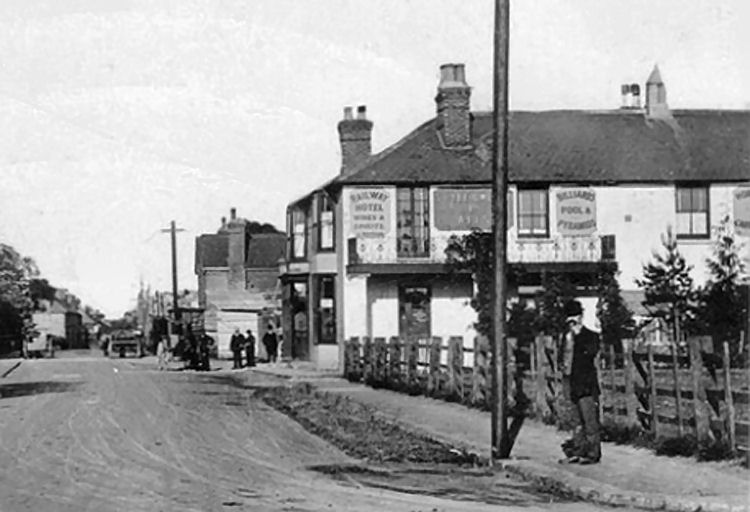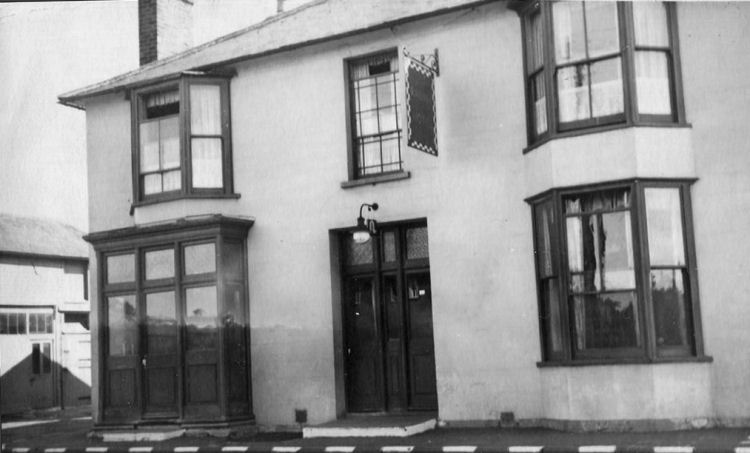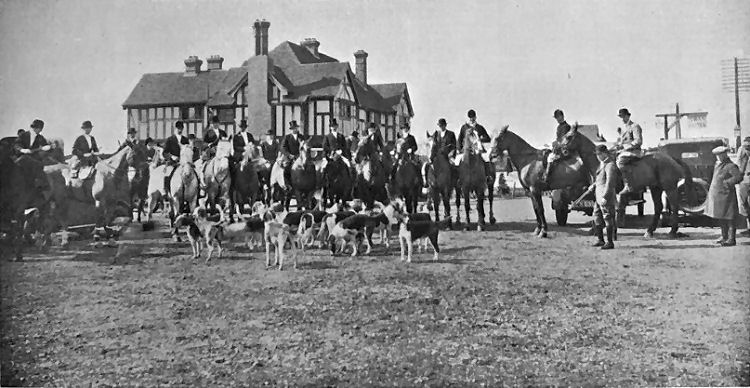|
30 Station Road / Wheeler Street
Headcorn

Above photo, date unknown, kindly sent by Debi Birkin. |

Above photo, date unknown. |

Above photo, date unknown, from Neil Aldridge. |
The "Railway Hotel" was situated in Station Road and was built just after
the railway came to Headcorn in 1905, but was demolished in 1982. The
railway proved unprofitable and closed in 1954 but opened again in 1989. The
line was electrified around 1962 and together with road building [A20/M20]
saw the demise of the Mid Kent Staghounds who frequented this premise. This
pack hunted a carted deer which was released at the start of each hunt and
then re-captured and returned to the Hunt paddocks at the Kennels. As these
deer would sometimes go 12-15 miles in any direction, with the increase of
traffic in the 1960s, bit of a nightmare. Public Liability!! One time a
number of dogs were killed when they followed a stag across the railway.
Headcorn station was the first stop for troops returning from Dunkirk.
I am informed by Geoffrey Pieters that the pub was renamed the "Windmill"
prior to demolition, but as yet this is the only information I have.
|
Kentish Gazette, 23 November 1852.
Fatal, Accident on the South Eastern Railway.
On Thursday last, Nov. 18, an inquest was held at the "Railway
Hotel," before Wm. T. Mere, Esq, deputy coroner, and a
respectable jury, to enquire as to the death of John Bingham, who
was accidentally killed on the morning of Wednesday last.
John Wildes, plate-layer, deposed:— Yesterday morning, 17th inst.,
at about 20 minutes past seven, I found the body of the
deceased in the water, close to the Railway by Kelsham Bridge; he
was quite dead; a lamp that he had been using was found
between the down line of rails, about four or five rods from where
I found the body, on this side of the bridge. There were
marks about a foot from the outside of the rails of his having
tripped from there into the water. With assistance I brought the
body to this house; the skull is very much fractured.
Stephen Card, of Dover, deposed:— I am inspector of the permanent
way on this railway. The deceased was one of the extra
hands employed in the Staplehurst District during floody times;
during the late floods he has taken his turn at night, by No.
70 Viaduct, or Kelsham Bridge; a bridge under the railway,
signalling the trains. He was supplied with a hand lamp, with a
red, green, and white light, by which to signal the trains.
Thomas Cook, platelayer, deposed:— Deceased was a labourer under me;
last Tuesday evening, about half-past seven
deceased and I walked together, and went to the bridges, that we
were stationed at to signal. We each had a signal lamp; he
was to have remained by Kelsham-bridge all night, and as the trains
approached was to have shown his lamp, a white light if
all was right, and a different colour if every thing was not quite
right. I was at the next bridge on the Staplehurst side, about
half a mile from Kelsham-bridge. I saw deceased's light after the
down mail train had passed. After this a pick-up train and an
engine and tender passed on the down line. The pick-up passed at
about 11, and the engine and tender passed at about two
o'clock, at about the same time that the latter passed the goods
train passed on the up line, the empty engine passed me
first, and in about 10 minutes the goods train passed me; the two
trains must have passed each other about where deceased
was.
Richard Tickle, of Dover, deposed:— I am engine driver, and was
driving the up goods train from Dover to London on
Tuesday night last. I left the Headcom Station at about five minutes
past two o'clock, and met the Pilot engine soon after I
passed over Kelsham Bridge; a man was standing on the outside of the
down rail, with a signal lamp, showing a white light. If
he had remained where he was then standing he would not have been
struck by the down engine. It was rather windy but it
was a clear night.
Henry Fagg, of Ashford, deposed:— I was the driver of the Ramsgate
goods train, and went from Ashford to Tunbridge with
it on Tuesday night, and returned with the engine and tender. I left
Tunbridge at 25 minutes past one on Wednesday
morning. I met the up goods train just at the other side of the
second bridge from Headcorn. I saw no one on the bridge,
and no signal light, nor was I conscious that the engine had struck
anything. I was travelling at the rate of about 12 or 15
miles per hour.
Verdict, "Accidentally killed."
|
|
Southeastern Gazette, 9 August 1853.
BEARSTED.
Petty Sessions, Aug. 1.
(Before E. Burton, Esq., in the chair, Sir E. Filmer, Bart., D.
Scratton and C. G. Whittaker, Esqrs.)
Charles Milner and Thomas Boorman were charged with having, at the
"Railway Hotel," Headcorn, on the 29th June, unlawfully assaulted
Samuel Goodwin.
Case dismissed.
|
|
Southeastern Gazette, 23 August 1853.
HEADCORN. Coroner’s Inquest.
Considerable excitement has been occasioned in this parish, in
consequence of the death of a man named Thomas Collison, aged 28
years, it being alleged that his death resulted from violence he
received at the "King’s Arms" public-house, kept by Mr. Waghorne. On
Tuesday last an inquest was held on the body at the "Railway Hotel,"
Headcorn, before W. T. Neve, Esq., and a respectable and intelligent
jury, fifteen in number, of whom Mr. George Dear was foreman.
The principal evidence adduced was that of a man named Thomas
Bottle, of Harrietsham, who stated that the deceased worked at Mr.
Love’s, at the "Railway Hotel." On Monday evening, the 8th inst.,
the deceased and Waghorne, jun., had a scuffle in the road. He
pushed him down and jumped on him. Afterwards deceased went into
Waghorne’s, and was very troublesome, and Mr. 'Waghorne sen., put
him out of the house, flinging him against the door-post, and they
fell together. He did not appear to be at all hurt when he got up,
but went into the house and drank off a pot of porter which was
standing on the table, belonging to other persons. Witness
afterwards left Waghorne’s, in company with the deceased. They went
down singing and holloaing to Mr. Love’s, and both went into a loft
over the stable. Deceased sat down on the top of the stairs. Witness
asked him several times to go to bed, and he said he would
presently. He left him sitting on the stairs, when he (witness) went
to sleep in the loft.
Next morning, when he got up, at about five o’clock, he saw deceased
in the stable under the manger. He spoke to him, but he did not
answer. It was not light enough for him to see whether there was
anything the matter with him. The deceased, it appeared, was shortly
afterwards discovered by a person named Drowley, under the manger,
covered with blood, and bleeding, at the foot of the stairs. There
was a quantity of blood lying there. He was then insensible, but
afterwards became conscious, and requested that a medical man should
not be sent for, as he believed he should be well next day, and
accordingly medical assistance was not called in till the next
night, and he was ultimately removed to his father’s house. The
deceased stated to his mother that he received his injuries at Mr.
Waghorne’s; that Mr. Waghorne was one that hurt him; that some of
the party kicked and others stamped on him; and that Waghorne’s boy
was one that jumped on him. He repeated the same to his mother on
the following Friday, upon her asking him if he was quite sure how
he was hurt, and he then added that he bled from the nose and mouth
while going home from Waghorne’s. He also told Mr. Love that he
received the injuries at Mr. Waghorne’s; that the boy jumped on him,
but it was all in play; that no person came home with him; and that
he crawled on his hands and knees half the way home. These
statements, however, were rebutted by the testimony of the other
witnesses, a man named Reeves fully corroborating Bottle’s evidence
as to his accompanying deceased at one o’clock, holloaing, laughing,
and running, home, and several witnesses being called, proved that
he did not receive any injury at Waghorne’s.
Mr. David Skinner, surgeon, deposed to attending deceased, and
stated his death to have resulted from a fracture of the skull,
which had caused inflammation of the brain.
The fracture must have been occasioned by a fall on the head, or a
heavy blow from a flat instrument. The injury was so great that if
he had received it at the "King’s Arms," he could not have gone as
far as Mr. Love’s. The most probable cause was that the injuries
were caused by deceased falling down stairs. If that were the case
he would be likely to have no recollection of it.
The jury concurred in these opinions, and returned a verdict "That
deceased accidentally fell down stairs from a loft, while
intoxicated, from the effects of which he died."
|
|
From the Maidstone Telegraph, Saturday 8 January 1870.
TRANSFER OF LICENSES.
An application was made for the transfer of the license of the
"Railway Inn," Headcorn, from Jane Gibbs to Charles Wilson.
The proper services of the notices was proved, and the transfer
granted.
In answer to the Bench, Mr. Wilson said he formerly lived as
butcher, at Lancaster Gate, Hyde Park.
|
|
Whitstable Times and Herne Bay Herald, Saturday 17 September 1881.
Headcorn.
On Tuesday afternoon an inquest was held at the "Railway Hotel,"
Headcorn, before G. Hills, Esq., coroner, touching the death of
William Page, age 53, and James Barton, 34, platelayers' labourers
on the South Eastern Railway. The men were at work about half a mile
beyond Headcorn, on the up line, at about 20 minutes to 9 o'clock on
Monday morning, when I through train which goes up from the Isle of
Thanet every morning, and does not stop after leaving Canterbury,
came along. The driver blew both whistles of his engine, but the
unfortunate men, who were at work with their heads towards the
approaching train, although they could not see it in consequence of
being in a stooping position, did not hear the train because the
down mail was passing at the moment. The engine of the up train took
the back portions of their heads off, killing them instantly. A
verdict of accidentally killed was returned.
|
|
From the Anchor, (house magazine for Barclay, Perkins Anchor Brewery
Volume X, No.1, January 1930.
Swan, Charing.
Among those present at a recent Meet of the Mid-Kent Staghounds at
the "Swan Hotel," Charing, was Lt. Col. G B Winch, one
of our Directors and Chairman of Style & Winch Ltd. He is seen third
(mounted) from the right and we are pleased to
report he has made a good recovery from his recent accident in the
hunting field. There are hunt stables at the "Dering
Arms," Pluckley and the "Railway Hotel," Headcorn.

By Rory Kehoe:-
The Winches, of Boughton Monchelsea House, were a classic "beerage"
family, closely connected not just to Style & Winch
in Kent but Wells & Winch of Biggleswade, Beds and Soulby, Sons &
Winch of Louth, Lincs. |
LICENSEE LIST
OTTAWAY John 1851+ (age 58 in 1851 ) )
WESTEN William 1858+
GIBBS Jane to Jan/1870

WILSON Charles Jan/1870+

WATERS Henry 1871-23/July/1881 dec'd (age 28 in 1871 ) )
WATERS Fanny Matilda Mrs 1882+ (later married to Thomas Gibson)
GIBSON N 1890+
GIBSON Thomas Charles 1887-91+ (age 36 in 1891 ) )

DAWSON Robert 1901-03+ (age 38 in 1901 ) )

 HUGHES Gordon 1951-64
HUGHES Gordon 1951-64
 Maidstone
and Kentish Journal Maidstone
and Kentish Journal
 Maidstone
Telegraph Maidstone
Telegraph
 Census Census
 From the Kelly's Directory 1903 From the Kelly's Directory 1903
|



